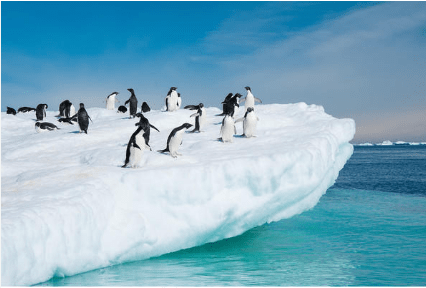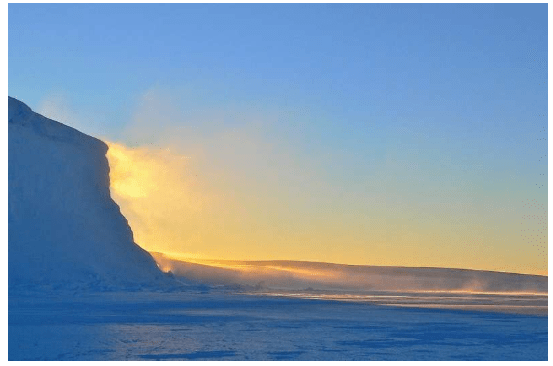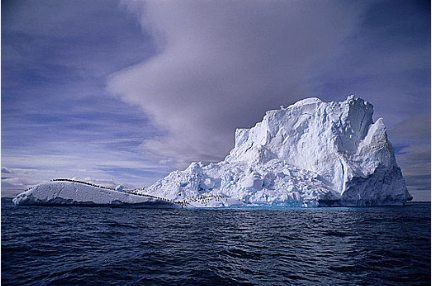Antarctic Transformation: Global Implications of Dramatic Changes


The latest report from the Scientific Committee on Antarctic Research sheds light on the devastating effects of climate change on Antarctica’s ice sheets, climate, and ecosystems. The melting of Antarctica’s ice sheets is a major contributing factor to global sea-level rise, which threatens to submerge coastal cities and regions in the near future. Additionally, Antarctica’s changing climate has severe implications for the rest of the planet, including more extreme weather patterns and disruptions to ocean currents. The report also highlights how rising temperatures in Antarctica are causing shifts in the region’s ecosystems, which have far-reaching consequences for wildlife such as penguins, seals and whales, that rely on the unique ecosystem to survive. These changes not only impact the fragile Antarctic ecosystems, but also the global food web that depends on these species. Overall, this report serves as an urgent call to action to address the rapidly escalating effects of climate change on the delicate balance of Antarctica’s environment and its global impact.
The report released at the Antarctic Treaty Consultative Meeting highlights a worrying trend in the region. The Antarctic ice sheets are melting, and climate changes are causing the Southern Ocean to become more acidic and lose oxygen. These changes are affecting the region’s whales, seals, penguins, and their food source, krill. The report warns that unless urgent action is taken, Emperor penguins could be all but gone by the end of the century.
While Antarctica may seem remote and isolated, the changes in the region have significant impacts on all other continents. As Cassandra Brooks, an assistant professor of environmental studies and contributor to the report, points out, “What happens in Antarctica, does not stay in Antarctica.” The melting of the ice sheets alone can cause a rise in sea levels, affecting coastal regions globally. The changes in the Southern Ocean can impact fish populations, affecting the livelihoods of people in other parts of the world. Climate changes in Antarctica can even impact weather patterns in other regions, leading to more extreme weather events like hurricanes and typhoons.
It is clear that urgent action is needed to address the changes in Antarctica and mitigate their impacts on the rest of the world. This report serves as a wake-up call for policymakers and citizens alike, highlighting the need for sustained efforts to reduce greenhouse gas emissions, protect marine life, and conserve biodiversity in the region. As Brooks says, “Antarctica is not just the canary in the coal mine; it is the entire coal mine.”
Melting ice sheets mean that global average sea level rise will put nearly a billion people at risk from coastal flooding over the next several decades, a number that could increase by the end of the century. The Antarctic has also played a profound role in regulating the world’s climate, in part by absorbing heat and carbon dioxide emissions resulting from human activity.
The report also states that: “Global impacts influenced by Antarctic change include extreme climate and weather events, droughts, wildfires and floods, and ocean acidification.”

For example, current levels of global warming have already committed the planet to about 16 inches (40 cm) of global sea level rise, which turns what was considered a one in 100-year coastal flood event into an annual one.
“Antarctica’s changes have profound consequences for all of us,” said Monash University Professor Steven Chown, who led the report and is SCAR’s immediate past president. Chown is also Director of Securing Antarctica’s Environmental Future (SAEF), of which Brooks is a Partner Investigator, through CU Boulder’s status as a Participating Organization.
During the 44th Annual Meeting of the Parties to the Antarctic Treaty in Berlin, a report was presented, emphasizing that achieving the greenhouse gas emissions reductions targets outlined in the Paris Climate Agreement will significantly reduce the negative impacts of climate change in Antarctica and its consequences for societies worldwide. Although the report was well received, the Parties could not reach a consensus agreement to protect Emperor penguins, which are projected to be threatened with near extinction due to climate change. There will be another chance to discuss this issue in October during a meeting focused on managing the Southern Ocean.

Governments are currently discussing various measures, including protecting vast areas of the Southern Ocean and implementing more resilient climate management strategies. As stated in the report, an evolving Antarctica has significant global implications. Brooks, a recipient of the Faculty Early Career Development Program, warns that protecting the Southern Ocean is imperative as it serves as a vital habitat for many species, such as the Antarctic toothfish, the Southern Ocean’s top fish predator and an important indicator of the Ross Sea system’s health. The report highlights that reducing greenhouse gas emissions remains a global responsibility to ensure the safety and protection of Antarctica and, in turn, our own futures.








